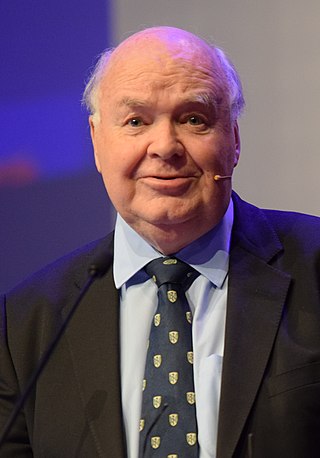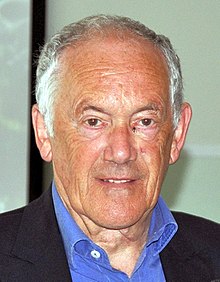Career
Atkins left school (Dr Challoner's Grammar School, Amersham) at fifteen and took a job at Monsanto as a laboratory assistant. He studied for A-levels by himself and gained a place, following a last-minute interview, at the University of Leicester.
Atkins studied chemistry there, obtaining a BSc degree in chemistry, and a PhD degree in 1964 for research into electron spin resonance spectroscopy, and other aspects of theoretical chemistry. Atkins then took a postdoctoral position at UCLA as a Harkness Fellow of the Commonwealth fund. [1] He returned to Britain in 1965 as a fellow and tutor of Lincoln College, Oxford, and lecturer in physical chemistry (later, professor of physical chemistry). In 1969, he won the Royal Society of Chemistry's Meldola Medal. In 1996 he was awarded the Title of Distinction of Professor of Chemistry. He retired in 2007, and since then has been a full-time author. [2]
He has honorary doctorates from the University of Utrecht, the University of Leicester (where he sits on the university Court), Mendeleev University in Moscow, and Kazan State Technological University.
He was a member of the Council of the Royal Institution and the Royal Society of Chemistry. He was the founding chairman of IUPAC Committee on Chemistry Education, and is a trustee of a variety of charities.
Atkins has lectured in quantum mechanics, quantum chemistry, and thermodynamics courses (up to graduate level) at the University of Oxford. He is a patron of the Oxford University Scientific Society.
In 2016 Atkins received the James T. Grady-James H. Stack Award for Interpreting Chemistry for the Public from the American Chemical Society. [3]
Views on religion
Atkins is a well-known atheist. [4] He has written and spoken on issues of humanism, atheism, and conflicts between science and religion. According to Atkins, whereas religion scorns the power of human comprehension, science respects it. [5]
He was the first Senior Member of the Oxford University Secular Society, a Distinguished Supporter of Humanists UK (formerly known as the British Humanist Association) and an Honorary Associate of the National Secular Society. [6] He is also a member of the advisory board of The Reason Project, a US-based charitable foundation devoted to spreading scientific knowledge and secular values in society. The organisation is led by fellow atheist and author Sam Harris. Atkins has regularly participated in debates with theists, including John Lennox, [7] Alister McGrath, Stephen C. Meyer, Hugh Ross, [8] William Lane Craig, [9] [10] Rabbi Shmuley Boteach, [11] and Richard Swinburne.
In December 2006, Atkins was interviewed by journalist Rod Liddle in a UK television documentary on atheism called The Trouble with Atheism . In the documentary, Liddle asked Atkins: "Give me your views on the existence, or otherwise, of God." Atkins replied: "Well, it's fairly straightforward: There isn't one. And there's no evidence for one, no reason to believe that there is one, and so I don't believe that there is one. And I think that it is rather foolish that people do think that there is one." [12] In July 2016, Atkins was quoted as stating, “We are a hiccup on the way from one oblivion to another oblivion.” [13]
Atkins is known for his use of strident language in criticising religion: He appeared in the 2008 documentary-style film Expelled: No Intelligence Allowed , in which he told interviewer Ben Stein that religion was "a fantasy" and "completely empty of any explanatory content. It is also evil". [14]
In 2007, Atkins's position on religion was described by Colin Tudge in an article in The Guardian as being non-scientific. In the same article, Atkins was also described as being "more hardline than Richard Dawkins", and of deliberately choosing to ignore Peter Medawar's famous adage that "Science is the art of the soluble". [15]
Chemistry is the scientific study of the properties and behavior of matter. It is a physical science within the natural sciences that studies the chemical elements that make up matter and compounds made of atoms, molecules and ions: their composition, structure, properties, behavior and the changes they undergo during reactions with other substances. Chemistry also addresses the nature of chemical bonds in chemical compounds.

Physical chemistry is the study of macroscopic and microscopic phenomena in chemical systems in terms of the principles, practices, and concepts of physics such as motion, energy, force, time, thermodynamics, quantum chemistry, statistical mechanics, analytical dynamics and chemical equilibria.
Quantum chemistry, also called molecular quantum mechanics, is a branch of physical chemistry focused on the application of quantum mechanics to chemical systems, particularly towards the quantum-mechanical calculation of electronic contributions to physical and chemical properties of molecules, materials, and solutions at the atomic level. These calculations include systematically applied approximations intended to make calculations computationally feasible while still capturing as much information about important contributions to the computed wave functions as well as to observable properties such as structures, spectra, and thermodynamic properties. Quantum chemistry is also concerned with the computation of quantum effects on molecular dynamics and chemical kinetics.
Secularism is the principle of seeking to conduct human affairs based on naturalistic considerations, uninvolved with religion.
Atomic, molecular, and optical physics (AMO) is the study of matter–matter and light–matter interactions, at the scale of one or a few atoms and energy scales around several electron volts. The three areas are closely interrelated. AMO theory includes classical, semi-classical and quantum treatments. Typically, the theory and applications of emission, absorption, scattering of electromagnetic radiation (light) from excited atoms and molecules, analysis of spectroscopy, generation of lasers and masers, and the optical properties of matter in general, fall into these categories.
Irreligion is the absence or rejection of religious beliefs or practices. It encompasses a wide range of viewpoints drawn from various philosophical and intellectual perspectives, including atheism, agnosticism, skepticism, rationalism, and secularism. These perspectives can vary, with individuals who identify as irreligious holding a diverse array of specific beliefs about religion or its role in their lives.

In sociology, secularization is a multilayered concept that generally denotes "a transition from a religious to a more worldly level." There are many types of secularization and most do not lead to atheism, irreligion, nor are they automatically anti-thetical to religion. Secularization has different connotations such as implying differentiation of secular from religious domains, the marginalization of religion in those domains, or it may also entail the transformation of religion as a result of its recharacterization.
Secularity, also the secular or secularness, is the state of being unrelated or neutral in regards to religion. Origins of secularity can be traced to the Bible itself and fleshed out through Christian history into the modern era. In the medieval period there were even secular clergy. Furthermore, secular and religious entities were not separated in the medieval period, but coexisted and interacted naturally.
In physics and chemistry, the spin quantum number is a quantum number that describes the intrinsic angular momentum of an electron or other particle. It has the same value for all particles of the same type, such as s = 1/2 for all electrons. It is an integer for all bosons, such as photons, and a half-odd-integer for all fermions, such as electrons and protons.

Alister Edgar McGrath is a Northern Irish theologian, Anglican priest, intellectual historian, scientist, Christian apologist, and public intellectual. He currently holds the Andreas Idreos Professorship in Science and Religion in the Faculty of Theology and Religion, and is a fellow of Harris Manchester College at the University of Oxford, and is Professor of Divinity at Gresham College. He was previously Professor of Theology, Ministry, and Education at King's College London and Head of the Centre for Theology, Religion and Culture, Professor of Historical Theology at the University of Oxford, and was principal of Wycliffe Hall, Oxford, until 2005.

Walter Heinrich Heitler was a German physicist who made contributions to quantum electrodynamics and quantum field theory. He brought chemistry under quantum mechanics through his theory of valence bonding.
Criticism of atheism is criticism of the concepts, validity, or impact of atheism, including associated political and social implications. Criticisms include positions based on the history of science, philosophical and logical criticisms, findings in both the natural and social sciences, theistic apologetic arguments, arguments pertaining to ethics and morality, the effects of atheism on the individual, or the assumptions that underpin atheism.
Nancey Murphy is an American philosopher and theologian who is Professor of Christian Philosophy at Fuller Theological Seminary, Pasadena, CA. She received the B.A. from Creighton University in 1973, the Ph.D. from University of California, Berkeley in 1980, and the Th.D. from the Graduate Theological Union (theology) in 1987.
In thermodynamics, the interpretation of entropy as a measure of energy dispersal has been exercised against the background of the traditional view, introduced by Ludwig Boltzmann, of entropy as a quantitative measure of disorder. The energy dispersal approach avoids the ambiguous term 'disorder'. An early advocate of the energy dispersal conception was Edward A. Guggenheim in 1949, using the word 'spread'.

Common thermodynamic equations and quantities in thermodynamics, using mathematical notation, are as follows:
The Trouble with Atheism is an hour-long documentary on atheism, presented by Rod Liddle. It was broadcast on Channel 4 in Britain in December 2006. The documentary focuses on criticising atheism for its perceived similarities to religion, as well as arrogance and intolerance. The programme includes interviews with a number of prominent scientists, including atheists Richard Dawkins and Peter Atkins and Anglican priest John Polkinghorne. It also includes an interview with Ellen Johnson, the president of American Atheists.
In spectroscopy and quantum chemistry, the multiplicity of an energy level is defined as 2S+1, where S is the total spin angular momentum. States with multiplicity 1, 2, 3, 4, 5 are respectively called singlets, doublets, triplets, quartets and quintets.

John Carson Lennox is a mathematician, bioethicist, and Christian apologist originally from Northern Ireland. He has written many books on religion, ethics, the relationship between science and God, and has had public debates with atheists including Richard Dawkins and Christopher Hitchens.
Agnostic atheism or atheistic agnosticism is a philosophical position that encompasses both atheism and agnosticism. Agnostic atheists are atheistic because they do not hold a belief in the existence of any deity and are agnostic because they claim that the existence of a divine entity or entities is either unknowable in principle or currently unknown in fact.
The term New Atheism describes the positions of some atheist academics, writers, scientists, and philosophers of the 20th and 21st centuries. New Atheism advocates the view that superstition, religion, and irrationalism should not simply be tolerated. Instead, they advocate the antitheist view that the various forms of theism should be criticised, countered, examined, and challenged by rational argument, especially when they exert strong influence on the broader society, such as in government, education, and politics. Major figures of New Atheism include Richard Dawkins, Sam Harris, Christopher Hitchens and Daniel Dennett, collectively referred to as the "Four Horsemen" of the movement, as well as Ayaan Hirsi Ali until her conversion to Christianity in 2023.






